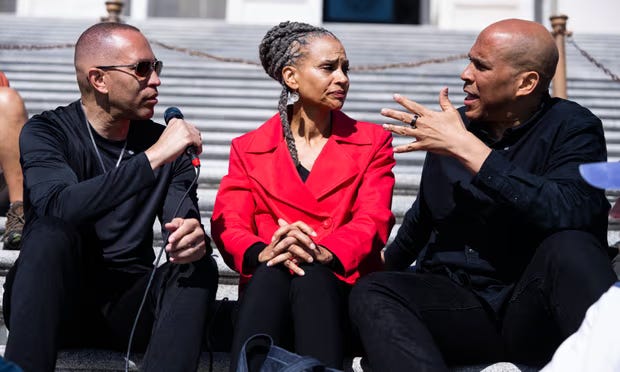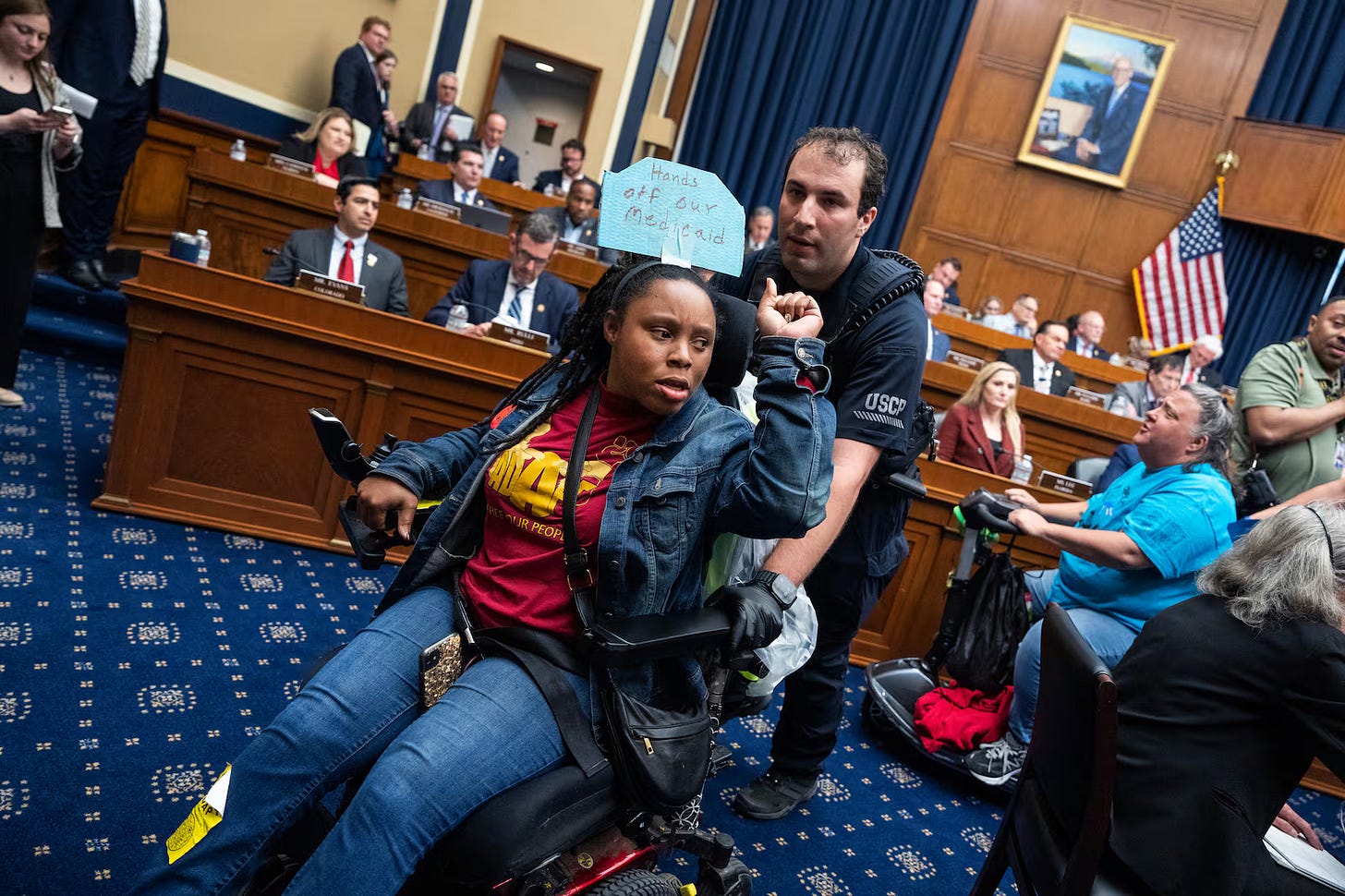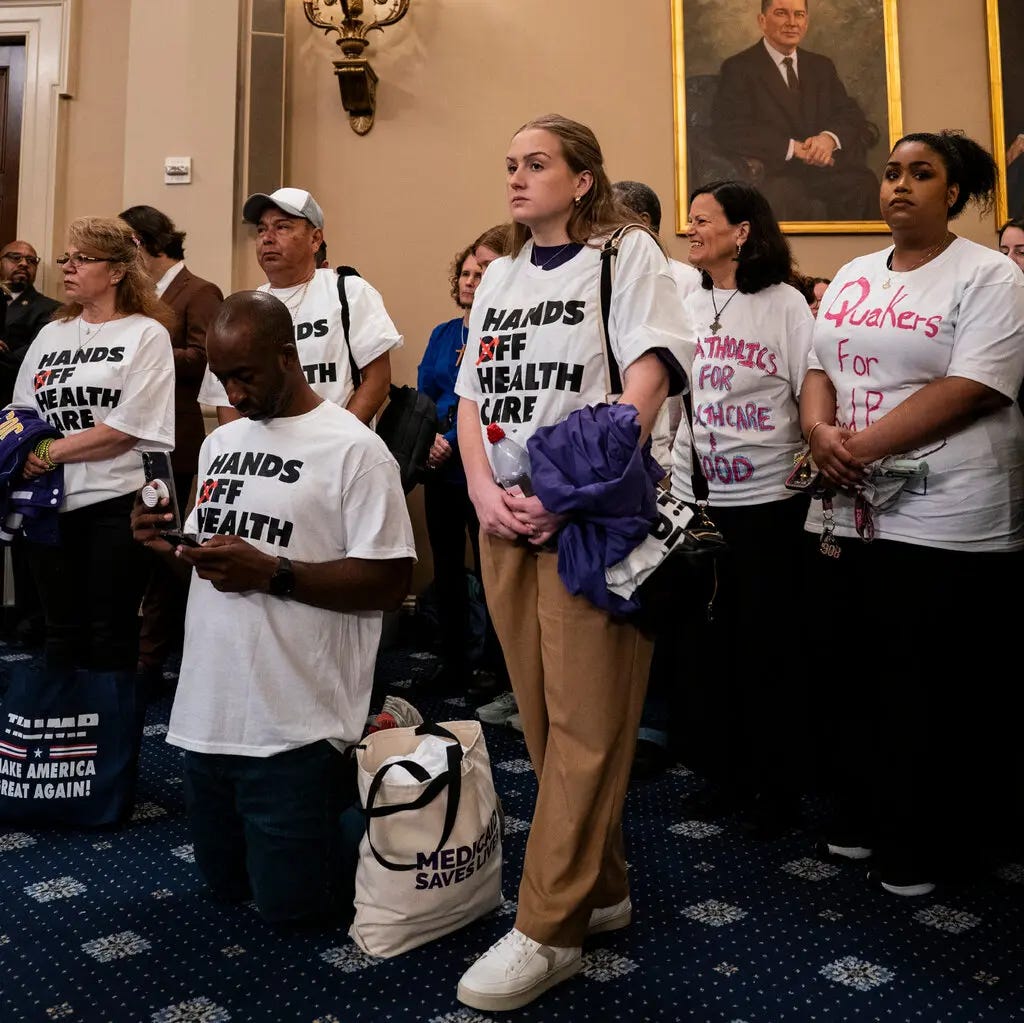📌 All Hands on Deck: It's time to defeat the 'Big Beautiful Bill'
We have days to stop a disaster. Here’s how.
Welcome to How to Resist, a blueprint for resistance based on nonviolence, mutual aid, and community building for ordinary people who want to save democracy.
This post wouldn’t exist without the support of our paid subscribers. Thank you for allowing me to publish without paywalls or advertising so that together we can save democracy.
UPDATE, 10:52pm
A few hours after this post was published, the news started coming in that Republican Senators joined Democrats to vote against the bill in the Budget Committee, which will prevent the bill from moving forward. Unfortunately, it’s because some Senators wanted more cuts.1 2 3
We still have a long way to go before this fight is over.
Dear Resisters,
On Wednesday, the House passed Trump’s “One Big, Beautiful Bill,” a sweeping piece of legislation that could reshape the U.S. economy, healthcare system, and social safety net for a generation. While Republicans are celebrating it as a return to “America First” values, the bill is loaded with giveaways to the wealthy, gimmicks that don’t address real needs, deep cuts to essential programs, and controversial ‘culture war’ provisions.4
The bad news is that Speaker of the House Mike Johnson is pushing hard to get the bill through the Senate before the Memorial Day break, giving us a matter of days to do what we can to stop this bill.
The good news is that this bill is a political gamble with major weaknesses. Despite its success in the House, the bill is extremely fragile.
Republicans deliberately chose the reconciliation process for this bill: it prevents the Democrats from blocking the bill with a filibuster, limits debate to 20 hours, and only requires a simple majority of 51 votes to pass in the Senate. With a 51-49 Republican majority in the Senate, that means that every single Republican Senator would need to vote yes (assuming all Democrats vote no) for this bill to pass.
Let’s look at the four outcomes that are possible at this point in the process:
The bill passes as-is: All 51 Republican senators vote yes or 50 senators vote yes and Vice President JD Vance casts the tie-breaking vote.
The Senate amends the bill: Senators revise or remove controversial provisions, potentially sending them back to the House for revisions and another vote.
The bill is broken into smaller parts: Republicans would have to decide to split the bill into multiple reconciliation bills or separate legislation which would be a huge pain in the butt and not something Republicans are likely to want to do.
The bill fails in the Senate: All Democrats and 2 Republicans vote no. The ‘one big, beautiful bill’ dies. Republicans would have to come up with a different strategy that would give us more time to fight for the things that matter.
This was a longer intro than I usually write, but I wanted to be clear about where we are. If we lose this one, it’s over. We desperately need to defeat this bill as written in order to buy us more time and more opportunities to fight. The odds are in our favor if we are strategic— if we identify the weaknesses, find the pressure points, and apply the full weight of our collective power on those who represent us. We don’t need to win a landslide, we just need to hold the line.
Now, let’s talk about HOW.
M-.

What you need to know about what’s in this bill
Deep Cuts to Medicaid
These cuts are cruel and regressive, and will impact low-income and marginalized communities the most.
Adds work requirements for adults without children.
Blocks coverage for undocumented immigrants.
Bans Medicaid coverage for gender-affirming care for minors.
Cuts to SNAP (Food Assistance)
Slashes $290 billion from the Supplemental Nutrition Assistance Program (SNAP) which will increase hunger and poverty, especially among children and seniors.
Tax Cuts for the Wealthy
Probably the most insulting part of this bill is that the slashing of public services is designed to free up funds to pay for Trump’s tax cuts, of which nearly half of the benefits would go to the top 5% of taxpayers. Some have called this the ‘reverse Robinhood Effect’— stealing from the poor to pay the rich.
Permanently extends the 2017 Trump tax cuts, which disproportionately benefit high-income earners.
Raises the estate tax exemption to $15 million per person ($30 million per couple), which overwhelmingly benefits the ultra-wealthy
Expands the SALT deduction cap, which benefits wealthier taxpayers in high-tax states.
MAGA Wish-List Provisions
Abortion restrictions, such as blocking Planned Parenthood from federal funding
Bans federal funding for gender-affirming care for minors.
Restricts federal funds from going to “woke” or “pro-China” institutions, a vague, dog-whistle language that could have real consequences for education and research funding.

Doctors, nurses, and healthcare workers protest the cutting of funding for Medicaid outside of a hospital in Folsom, CA. Photo: Paul Kitagaki, Jr.
What weaknesses can we exploit?
The bill is too big and tries to do too much: This makes it vulnerable to external opposition from Democrats and internal opposition from Republicans who aren’t fully on board with all of the provisions.
No margin of error: With the reconciliation process, there is no margin of error for Republicans; they ALL have to vote yes for the bill to pass as-is.
We need only 2 Republican ‘no’ votes: That means that moderate or swing-state Republicans are critical pressure points.
GOP infighting means hardliners want more cuts, moderates think it goes too far…, and it’s going to be difficult to get all Senate Republicans on board.
‘Fiscally reckless’: Some Republicans, are calling the bill fiscally reckless. It’s estimated to reduce federal revenue by $4.1 trillion over 10 years.
Cuts to Medicaid are deeply unpopular: Republicans during the first Trump administration tried to cut Medicaid, and it backfired so spectacularly that they lost the Republican majority in the 2018 midterm elections. They haven’t forgotten the lesson.
Abortion provisions: Risky, even in red states.
Rushed timeline: It’s going to be awfully hard to get the needed votes by next weekend.
Who are the Republican Senators we need to focus on?
Sen. Ron Johnson (R-WI)
Called the bill a “sad joke” and criticized its size and structure.
Believes it should be broken into three separate bills.
Strongly opposed to the current version as passed by the House
Sen. Josh Hawley (R-MO)
Publicly opposed the bill’s Medicaid changes, including co-pays and hospital funding freezes.
Said: “I’m not going to support this bill from the House, in this form.”
Sen. Rand Paul (R-KY)
Criticized the bill’s spending cuts as “wimpy” and “anemic.”
Known for opposing large spending packages that don’t meet his fiscal standards
Sen. Lisa Murkowski (R-AK)
Often breaks with her party on healthcare and social issues.
Has not committed to supporting the bill and is waiting to see the final version.
Sen. Susan Collins (R-ME)
A moderate Republican who has opposed past GOP efforts to cut Medicaid.
Could be swayed by constituent pressure and the bill’s impact on healthcare.

Is your Senator one of these 5 Republicans Senators?
[Find your senator here: https://www.senate.gov/senators/senators-contact.htm]
If your representative is one of the six listed above, then you have an especially important role to play: Basically, we need you to relentlessly badger the sh*t out of your Senator until they agree to destroy this bill.
CALL DAILY and say, “I’m a constituent, and I strongly oppose the Big, Beautiful Bill as-is.. I’m, particularly concerned about [cuts to Medicaid, tax cuts for the wealthy, cuts to SNAP, abortion restrictions, etc]” 5Calls has a fact sheet and scripts for the major provisions in the bill to help make your call even more powerful. If you are phone-shy, call their office before 7 a.m. or 7 p.m. to leave a message (make sure to leave your full contact information so that your call is counted!)
Email or write letters. Include a personal story
Request a meeting (virtual or in-person) with their staff.
Show up at their office. Bring friends. Invite local media. Bring signed petitions and hand-deliver them to your representative.

What About the Rest of Us?
Not in a swing state? Not represented by one of the six key senators? Don’t worry, I’ve got jobs for you, too! Here’s how you can plug in, build momentum, and make an impact from wherever you are:
Civic Actions
In our best-case scenario (we defeat this bill, or if the Senate decides to amend the bill), we are going to have to prepare for a long fight with a lot of public pressure to make sure that the harmful provisions are rejected or don’t resurface as part of a new bill.
Contact your representatives: Reach out to your U.S. Senators and House Representatives to express your opposition to the bill. Be specific about your concerns, such as Medicaid cuts or the SALT deduction repeal.
Attend town halls: Engage directly with lawmakers at public events. Ask questions, demand transparency, and urge them to vote against the bill.
Build coalitions: Join local organizations, unions, and advocacy groups near you to amplify your impact.
Educate and mobilize voters: We need to remember how our representatives acted and voted during this process and hold them accountable in our next elections.
Collective Nonviolent Action
Even if your senator is a lost cause (or already on our side), public pressure still matters. We need to make it crystal clear that we are not giving up the fight and that Republicans are going to have to fight tooth and nail for every provision they want.
Call-in days: Pick a day, grab some friends, and make some calls—Zoom call, snacks, and scripts make it more fun (and easier!)
Office sit-ins: Peaceful, powerful, and impossible to ignore.
Creative protests: Banners, street theater, music, flash mobs, costumes— whatever makes people stop and look (and share it on their Instagram!)
Town hall takeovers: Ask the hard questions, and keep asking until you get real answers.
Petitions & open letters: Especially powerful when signed by professionals: doctors, teachers, veterans, artists, faith leaders, etc.

Mutual Aid as Resistance
This bill threatens the most vulnerable among us. At How to Resist, we promote mutual aid as a way to meet people’s survival needs and critically engage with why those needs have not been met.
Food drives and community fridges: Help our neighbors who’ll be hit hardest by SNAP cuts.
Know-Your-Rights workshops: Share legal info and resources with your community.
Direct aid and crowdfunding: Raise money for folks who need it now, not later.

Community Building for the Long Haul
At How to Resist, we also advocate for community building as a critical strategy for building new futures that serve everyone, not just the rich and powerful.
Teach-ins and information sharing: Break down what’s in the bill and why it matters. Make it accessible. Make it real.
Art and storytelling: Murals, zines, TikToks, podcasts—whatever helps people feel what’s at stake.
Coalition building: Link up with unions, faith groups, student orgs, climate activists—anyone fighting for justice.
Voter outreach: A good job for the extroverts among us: knock doors, table at events, talk to your neighbors.
Want more ideas?
Check out the How to Resist archive for more ways to get involved.
Correction
An earlier version of this post listed Mitt Romney as a key Republican Senator. Mitt Romney is no longer in the Senate. The error was due to an out-of-date article in which Romney was talking about the Senate Budget Committee.
Support How to Resist
As a librarian committed to keeping How to Resist free to read and publicly available for everyone.
Currently, only 24 readers support this work through a paid subscription.
If this newsletter informs, empowers, or inspires you, please consider upgrading to a paid subscription. Your support helps sustain this work in the service of democracy—for as long as it’s needed.
Prefer a one-time contribution? You can donate at ko-fi.com/howtoresist
Sources
Beavers, O. (2025, May 14). Mike Johnson Contends With Republican Mistrust in Dash to Pass Tax Bill. The Wall Street Journal. https://www.wsj.com/politics/gop-tax-bill-speaker-mike-johnson-01456ff6
Erickson, B., Morgan, D., & Cowan, R. (2025, May 13). US Republicans face internal disagreements over Trump tax cut package. Reuters. https://www.reuters.com/business/healthcare-pharmaceuticals/us-republicans-kick-off-debate-trump-tax-cut-package-including-within-own-party-2025-05-13/
Fuchs, H., & Leonard, B. (2025, May 13). Medicaid cut protesters disrupt GOP megabill markup, 26 arrested - Live Updates - POLITICO. Politico. https://www.politico.com/live-updates/2025/05/13/congress/medicaid-cut-protestors-disrupt-gop-megabill-markup-00345841
Helmore, E. (2025, April 28). Hakeem Jeffries and Cory Booker hold 12-hour sit-in against GOP funding plan. The Guardian. https://www.theguardian.com/us-news/2025/apr/27/hakeem-jeffries-cory-booker-livestream-protest-republican-funding-bill
Merrilees, A. (2025, May 13). At Folsom hospital, dozens rally against proposed Medicaid cuts. The Sacramento Bee. https://www.sacbee.com/news/business/article306345246.html
Mitchell, K., Goode, A. J., Legg, M., Maloney, M., & Kowcheck, L. (2025, May 15). “The One, Big, Beautiful Bill” (At Least As Currently Drafted). Schneider Downs. https://schneiderdowns.com/our-thoughts-on/one-big-beautiful-bill-as-currently-drafted/
Mueller, E., Everett, B., & Goba, K. (2025, May 14). Republicans wrestle with possible failure of ‘big, beautiful bill.’ https://www.semafor.com/article/05/14/2025/republicans-wrestle-with-the-possible-failure-of-their-big-beautiful-strategy-for-trumps-agenda
Oppose Harmful Provisions in the Republican Budget Reconciliation Bill. (n.d.). 5 Calls. Retrieved May 16, 2025, from https://5calls.org/issue/budget-reconciliation-federal-cuts/
Rice, M. (2025, May 14). Trump’s ‘One Big Beautiful Bill’ Back on Life Support After Key Senator Announces Opposition. New York Sun. https://www.nysun.com/article/trumps-one-big-beautiful-bill-back-on-life-support-after-key-senator-announces-opposition
Trump tax cuts: Top 5% of taxpayers would get nearly half the benefit…. (2025, February 24). Archive.Is. https://archive.is/r4m6G
Walsh, D. (2025, May 14). The latest roadblock for House Republicans’ “big beautiful bill”: Senate Republicans. WPRL. https://www.wprl.org/npr-news/2025-05-14/the-latest-roadblock-for-house-republicans-big-beautiful-bill-senate-republicans
Watson, G., York, E., Muresianu, A., Durante, A., Li, H., Van Ness, P., & Shilov, A. (2025, May 13). “Big Beautiful Bill” House GOP Tax Plan: Preliminary Details and Analysis. Tax Foundation. https://taxfoundation.org/research/all/federal/big-beautiful-bill-house-gop-tax-plan/
Watson, G., York, E., Muresianu, A., Durante, A., Li, H., Van Ness, P., & Shilov, A. (2025, May 13). “Big Beautiful Bill” House GOP Tax Plan: Preliminary Details and Analysis. Tax Foundation. https://taxfoundation.org/research/all/federal/big-beautiful-bill-house-gop-tax-plan/





Kentucky progressive here, I've been contacting for the past 2 months and I won't stop now!!!
Didn't Mitt Romney retire from the Senate on January 3, 2025?